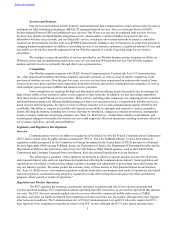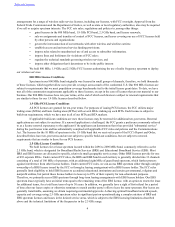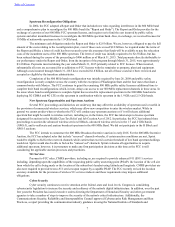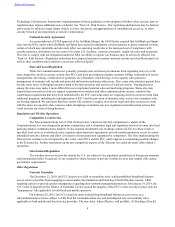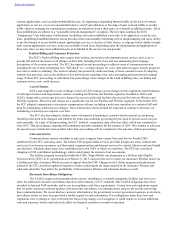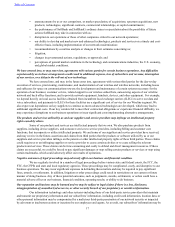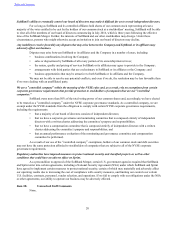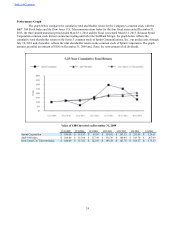Sprint - Nextel 2014 Annual Report Download - page 17
Download and view the complete annual report
Please find page 17 of the 2014 Sprint - Nextel annual report below. You can navigate through the pages in the report by either clicking on the pages listed below, or by using the keyword search tool below to find specific information within the annual report.
Table of Contents
15
which could result in increased costs, including increases to our bad debt expense and write-offs of installment billing
receivables. These arrangements may be particularly sensitive to changes in general economic conditions, and any declines in
the credit quality of our subscriber base could have a material adverse effect on our financial position and results of
operations.
Because we are one of the first wireless service providers to lease devices to subscribers, our device leasing program
exposes us to new risks, including those related to the actual residual value realized on returned devices, higher churn
and higher bad debt expense.
We also lease devices to certain of our subscribers. Our financial condition and results of operations depend, in
part, on our ability to appropriately assess the credit risk of our lease subscribers and the ability of our lease subscribers to
perform under our device leases. In addition to monthly lease payments, we expect to realize economic benefit from the
estimated residual value of a leased device, which is the estimated value of a leased device at the time of the expiration of the
lease term. Changes in residual value assumptions made at lease inception would affect the amount of depreciation expense
and the net amount of equipment under operating leases. If estimated residual values, in the aggregate, significantly decline
due to economic factors, obsolescence, or other circumstances, we may not realize such residual value, which could have a
material adverse effect on our financial position and results of operations. We may also suffer negative consequences,
including increased costs, as a result of a lease subscriber default, the related termination of a lease, and the attempted
repossession of the device. In addition, subscribers who lease a device are no longer required to sign a fixed-term service
contract, which could result in higher churn and higher bad debt expense.
Adverse economic conditions may negatively impact our business and financial performance, as well as our access to
financing on acceptable terms or at all.
Our business and financial performance are sensitive to changes in macro-economic conditions, including changes
in interest rates, consumer credit conditions, consumer debt levels, consumer confidence, rates of inflation (or concerns about
deflation), unemployment rates, energy costs, and other factors. Concerns about these and other factors may contribute to
market volatility and economic uncertainty.
Market turbulence and weak economic conditions may materially adversely affect our business and financial
performance in a number of ways. Our services are available to a broad customer base, a significant portion of which may be
more vulnerable to weak economic conditions. We may have greater difficulty in gaining new subscribers within this segment
and existing subscribers may be more likely to terminate service due to an inability to pay. In addition, instability in the
global financial markets has resulted in periodic volatility in the credit, equity, and fixed income markets. This volatility
could limit our access to the credit markets, leading to higher borrowing costs or, in some cases, the inability to obtain
financing on terms that are acceptable to us, or at all.
Weak economic conditions and credit conditions may also adversely impact various third parties on which we
rely, some of which have filed for or may be considering bankruptcy, experiencing cash flow or liquidity problems, or are
unable to obtain credit such that they may no longer be able to operate. Any of these could adversely impact our ability to
distribute, market, or sell our products and services. Difficult, or worsening, general economic conditions could have a
material adverse effect on our business, financial condition, and results of operations.
Government regulation could adversely affect our prospects and results of operations; federal and state regulatory
commissions may adopt new regulations or take other actions that could adversely affect our business prospects, future
growth, or results of operations.
The FCC, Federal Trade Commission, Consumer Financial Protection Bureau, and other federal, state and local,
as well as international, governmental authorities assert jurisdiction over our business and could adopt regulations or take
other actions that would adversely affect our business prospects or results of operations.
The licensing, construction, operation, sale and interconnection arrangements of wireless telecommunications
systems are regulated by the FCC and, depending on the jurisdiction, international, state and local regulatory agencies. In
particular, the FCC imposes significant regulation on licensees of wireless spectrum with respect to how radio spectrum is
used by licensees, the nature of the services that licensees may offer and how the services may be offered, and resolution of
issues of interference between spectrum bands. The FCC grants wireless licenses for terms of generally ten years that are
subject to renewal and revocation. There is no guarantee that our licenses will be renewed. Failure to comply with the FCC
requirements applicable to a given license could result in revocation of that license and, depending on the nature of the non-
compliance, other Sprint licenses.


